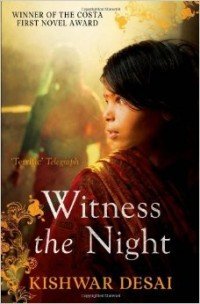We came across Kishwar Desai on a panel at the Quais du Polar Festival in Lyon, talking about the possible reasons for the lack of a crime writing tradition in India. Her Simran Singh series of novels has been well received in the English-speaking world and has been translated into several languages, including Hindi and Chinese. Witness the Night is her first novel. Published in 2010, it won the Costa First Novel Award that year.
Simran Singh is a hugely enjoyable creation, larger than life even in this, her first outing. A self-described ‘middle-aged, meddlesome social worker or NGO-wali’ and amateur psychiatrist, she is trying to placate her mother with vague marriage plans, but is happy to behave in ways that are regarded as highly unconventional in India. She smokes, drinks, has serial relationships with men and is unafraid to question the rules or challenge those in power.
She is called back to her home town of Jullundur, a dusty place with a small-town atmosphere, by her old college friend, Amarjit, now Inspector General in Punjab, to assist with a case. She is to support a traumatised 14-year-old girl, Durga, and assess her mental health. Durga is the sole survivor after 13 members of her family were found poisoned, some of them stabbed. They include here parents and brothers. Durga herself was beaten and raped, covered with so many wounds and so much blood that it is difficult to tell exactly what happened.
With no evidence of an intruder, and with the police superintendent keen to conclude the case quickly, the girl is the chief suspect, but Simran is not so sure of her guilt. As she delves deeper into the sad lives of Durga and her older sister, unwanted daughters in a very traditional and wealthy family, she comes up against surly servants, childhood rivals, corrupt politicians, many family secrets and a wall of silence. She finally finds two allies: Binny, Durga’s English-born sister-in-law, who escaped the massacre only because she had returned to England a few weeks previously to give birth to her baby there; and reporter Gurmit Singh, quite a bit younger than Simran but equally intrigued by the case.
This could be a very depressing book given the subject matter, but Desai’s lively style and down-to-earth, candid heroine make for an engaging read. Daily life in an Indian provincial town is described in colourful detail, complete with Anglo-Indian expressions and phrases in local languages. However, it is easy to skim over these without losing the plot, and they add to the atmosphere of the novel and the no-holds-barred appraisal of life in contemporary India, a country of contradictions, developing at different speeds in its different regions.
Kishwar Desai was born and raised in India and now spends her time between London, Goa and Delhi. She has worked in both TV and print journalism, and is the daughter of ‘possibly one of the very few incorruptible police officers’ in India. So she is unafraid to broach very controversial subjects that parts of Indian society believe are incompatible with the image of the modern, booming nation that they wish to portray. Infanticide of baby girls is the theme of the first book in the Simran Singh series. The second, Origins of Love, addresses the topic of international adoptions, HIV and surrogacy. The third, The Sea of Innocence, speaks of gang rape. This strong social thread running through her books can lead to a rather moralising tone at times, but in this first book the indignation is just about kept in check, tempered with humour and rich description. As well as being an enthralling read, Witness the Night is a valuable insight into a very different place, which many Westerners only view as a holiday destination.
Simon & Schuster
Print/Kindle/iBook
£5.99
CFL Rating: 4 Stars










